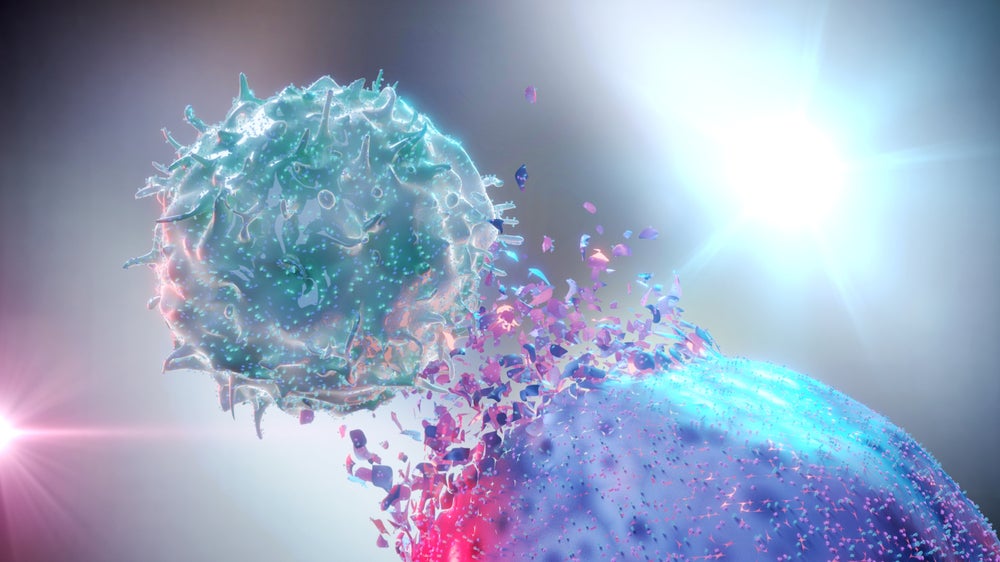

Senti Biosciences will cut 37% of its workforce as it reallocates funds to advance the clinical development of its acute myeloid leukaemia (AML) cell therapy candidate SENTI-202.
US-based Senti Bio stated the cost savings, which also include decreasing R&D activities, would extend its cash runway into Q1 2025, according to a 5 January press release.

Discover B2B Marketing That Performs
Combine business intelligence and editorial excellence to reach engaged professionals across 36 leading media platforms.
The headcount reduction, expected to be completed in Q1 2024, will cost the biotech around $1m in severance-related expenses.
Senti Bio, which went public in a $600m SPAC deal in December 2020, currently has 122 employees, according to Financial Times.
At this time last year, shares in Senti Bio were trading 59% higher. The company has a current market cap of $27.2m. In January 2023, Senti Bio already started adjusting funds by seeking a partner for its glypican 3 (GPC3)-expressing solid tumour candidate SENTI-301A.
Senti Bio found that partner in China-based Celest Therapeutics, with whom it entered a research collaboration in November 2023. In return for Celest taking charge of the candidate’s clinical development, Senti Bio is line to receive up to $156m in milestone and royalty-based payments.

US Tariffs are shifting - will you react or anticipate?
Don’t let policy changes catch you off guard. Stay proactive with real-time data and expert analysis.
By GlobalDataBoth SENTI-202 and SENTI-301A are off-the-shelf chimeric antigen receptor-natural killer (CAR-NK) cell therapies. CAR-NK therapy works by enhancing the cancer-fighting abilities of natural killer cells. Senti-Bio uses “gene circuits” to alter a cell’s genetic code to target cancer cells while leaving healthy cells alone. Sanofi, Gilead and Takeda are big spenders in the NK therapy space, having formed research partnerships with companies, including Innate Pharma, Dragonfly, and KSQ Therapeutics, respectively.
In its current fund reallocation, Senti Bio stated that priority will be given to SENTI-202. The first patient is expected to be dosed in the therapy’s Phase I clinical trial in Q2 2024, with initial efficacy data by the end of the year. The US Food and Drug Administration (FDA) granted an investigational new drug (IND) application for the drug in December 2023.
Meanwhile, Celest Therapeutics expects to dose the first patient in the SENTI-301A programme in H1 2024. The programme will initially focus on hepatocellular carcinoma, which has a higher prevalence in East Asia. Celest will oversee clinical development, operations, and manufacturing of its off-the-shelf CAR-NK cell therapy SENTI-301A, as per its 2023 agreement.
In its statement, Senti Bio did not announce plans for SENTI-401, the company’s other CAR-NK pre-clinical candidate for carcinoembryonic antigen (CEA)-positive cancer treatment.
Senti Bio’s CEO and co-founder Timothy Lu said: “We are taking the difficult but necessary steps to enhance our focus on demonstrating clinical proof-of-concept for our Gene Circuit technology and potentially bringing SENTI-202 and SENTI-301A to patients.”
In August 2023, the company subleased its production facility to CDMO GeneFab in a $38m deal.
Cell & Gene Therapy coverage on Pharmaceutical Technology is supported by Cytiva.
Editorial content is independently produced and follows the highest standards of journalistic integrity. Topic sponsors are not involved in the creation of editorial content.




